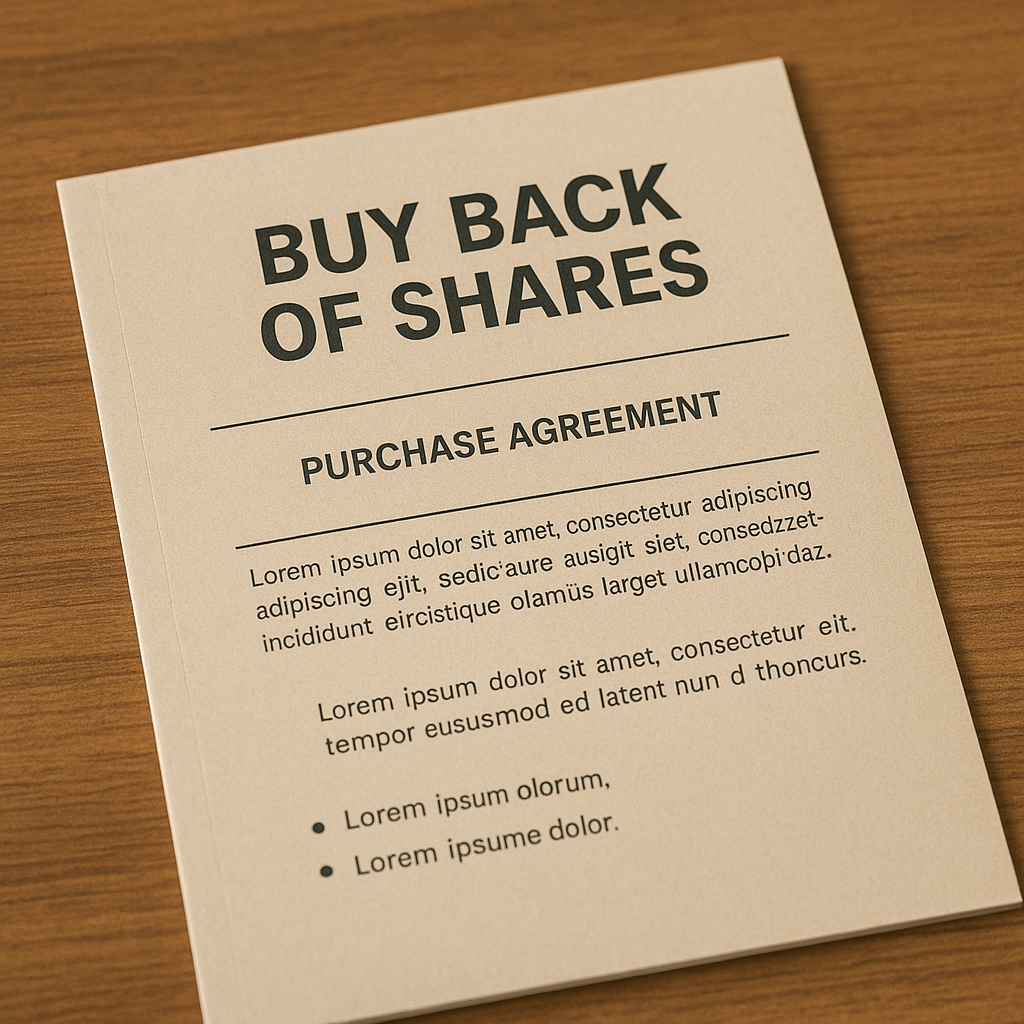What is Buy Back of Shares?
Buy back of shares, also called a share buyback or share repurchase, is when a company buys its own shares from the existing shareholders or the stock market. This reduces the total number of shares available in the market. Essentially, the company is returning money to shareholders by purchasing their shares, often at a price higher than the current market price
In simple terms, it means the company is taking back some ownership from the public or investors. This has the effect of increasing the value of the remaining shares because there are fewer shares in circulation. Each remaining share represents a bigger piece of the company, which can increase the earnings per share (EPS) and often leads to a rise in the stock price.
Provisions as per Companies Act 2013 relating to Buy Back
As per Section 68 of the Companies Act, 2013 a company can buy back its own shares.
As per section 68(1) of the Companies Act 2013 (hereinafter referred to as “Act”), Buy Back of shares can be made out of the following:
- Free Reserves (means reserves as per the last audited Balance Sheet which are available for distribution and share premium but not the share application amount)
- Share Premium account
- Proceeds of any Securities
Buy Back cannot be made out of proceeds of an earlier issue of the same kind of securities.
As per section 68(2) of the Act, the company shall purchase its own shares (buy back) unless:
(a) the buy-back is authorised by its articles;
(b) a special resolution has been passed at a general meeting of the company authorising the buy-back.
Provided nothing contained this clause shall be applicable where,
(i) the buy-back is, ten per cent or less of the total paid-up equity capital and free reserves of the company; and
(ii) such buy-back has been authorised by the Board by means of a resolution passed at its meeting;
(c) the buy-back is twenty-five per cent. or less of the aggregate of paid-up capital and free reserves of the company:
Provided that in respect of the buy-back of equity shares in any financial year, the reference to twenty-five per cent. in this clause shall be construed with respect to its total paid-up equity capital in that financial year;
(d) the ratio of the aggregate of secured and unsecured debts owed by the company after buy-back is not more than twice the paid-up capital and its free reserves:
Provided that the Central Government may, by order, notify a higher ratio of the debt to capital and free reserves for a class or classes of companies;
(e) all the shares or other specified securities for buy-back are fully paid-up;
(f) the buy-back of the shares or other specified securities listed on any recognised stock exchange is in accordance with the regulations made by the Securities and Exchange Board in this behalf; and
(g) the buy-back in respect of shares or other specified securities other than those specified in clause (f) is in accordance with such rules as may be prescribed:
Provided that no offer of buy-back under this sub-section shall be made within a period of one year reckoned from the date of the closure of the preceding offer of buy-back, if any.
Prohibition for Buy Back of Shares
As per Section 68(3) of the Act, there are certain prohibitions for buy back of shares as reproduced hereunder:
(1) No company shall directly or indirectly purchase its own shares or other specified securities—
(a) through any subsidiary company including its own subsidiary companies;
(b) through any investment company or group of investment companies; or
(c) if a default, is made by the company, in the repayment of deposits accepted either before or after the commencement of this Act, interest payment thereon, redemption of debentures or preference shares or payment of dividend to any shareholder, or repayment of any term loan or interest payable thereon to any financial institution or banking company:
Provided that the buy-back is not prohibited, if the default is remedied and a period of three years has lapsed after such default ceased to subsist.
(2) No company shall, directly or indirectly, purchase its own shares or other specified securities in case such company has not complied with the provisions of sections 92, 123, 127 and section 129.
Provisions of Income Tax for Buy Back of Shares
Capital Gains on Buy Back of shares or other securities
In case of shares of a company other than a domestic company and specified securities.
Consideration received by a holder (buyer) of specified securities (other than a domestic company) on buy back of shares or other specified securities, income tax is applicable in the hands of the holder (buyer).
Capital Gains will be calculated as the difference between the cost of acquisition and the value of consideration received by the holder of such shares or securities.
Such capital gains will be chargeable to tax in the year in which such securities were purchased (bought back) by the company.
In case of buy back shares by a domestic company.
Effected before 01-10-2024
In case of buy back of shares (whether by listed or unlisted company) before 01-10-2024 by a domestic company, Income Tax is payable by the company u/s 115QA of the Act. The company is liable to pay additional income-tax at the rate of twenty per cent (20%) (plus surcharge of 12% and Cess of 4%) on the distributed income.
Further, the income arising to shareholders in respect of buy back of shares is exempt u/s 10(34A), as the company is liable to pay additional income tax on buy back of shares.
Effected after 01-10-2024
In case of buy back of shares (whether by listed or unlisted company) after 01-10-2024 by a domestic company, the sum paid by the company for purchase of its own shares would be treated as Dividend and will be taxable under the head “Income from other sources” in the hands of shareholders. No deduction for expenses would be available against such dividend income.
Consequently, as per Section 46A, value of consideration received by a shareholder on buy back of shares by a domestic company will be NIL and the difference between the cost of acquisition and the consideration received by the shareholders will result in capital loss.
Further the capital loss arising from such transaction can be set off and carried forwarded as per the provision of set off and carry forward of losses of the Income Tax Act.
If it is a short-term capital loss, it can be set-off against both long term and short term capital gains. If it is a long-term capital loss, it can be set-off only against the long-term capital gains.


